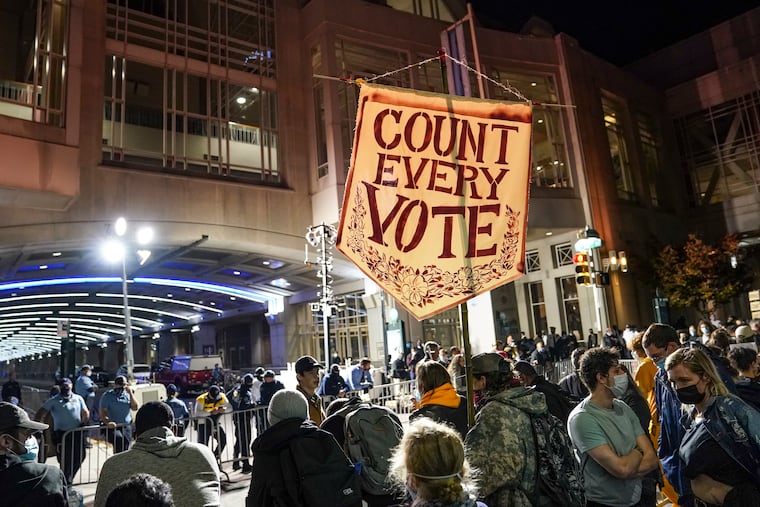Bring voter registration to Philly high schools now | Opinion
Despite a statement from Superintendent Hite promising that the school board would address this, the board has yet to vote on the proposal.

This month, the nation watched in horror as Georgia passed new voting laws that severely limit ballot access, especially for communities of color. In 43 states, elected officials have proposed similar voting laws that propose stringent new restrictions on voting, including in Pennsylvania.
In Philadelphia, we have an opportunity to combat this trend. For months, students, educators, and concerned citizens have spoken at Philadelphia Board of Education meetings, urging its members to consider a proposed policy to bring year-round nonpartisan voter registration and engagement programming to Philadelphia high schools.
Despite the moving testimony from students most impacted by a potential policy, and a statement from Superintendent William R. Hite Jr. promising that the school board would address this, the school board has yet to pass a resolution. Whether scared to appear partisan in our highly polarized political climate or overwhelmed by the mounting burdens of reopening school in the midst of the pandemic, the Philadelphia school board has yet to pass this bill, and in doing so, is complicit in the continued disenfranchisement of Philadelphia’s Black and brown communities: More than 85% of students in Philadelphia public schools are students of color.
» READ MORE: In 2020, we cheered for poll workers, so why aren’t they now prioritized for vaccines ahead of the primary? | Opinion
Voter education is one of the most powerful tools we have at our disposal to fight back against the growing attacks on our voting rights and our democracy. By requiring voter registration and education in every Philadelphia high school, the school board can ensure Philadelphia students are informed, registered, and ready to vote. The time to protect democracy and empower our communities is now.
Educating students about the importance of voting has an immediate and tangible impact on their behavior. According to the Center for Information and Research on Civic Learning and Engagement (CIRCLE) at Tufts University, youth are 40% more likely to vote if they are taught about voting. In Philadelphia, we’ve already seen how such voter education can work. In anticipation of the 2020 presidential election, dedicated organizers from Philly Youth Vote, When Philly Votes, Vote That Jawn, SEAMAAC, and countless other organizations educated, registered, and conducted outreach to 18-year-olds across the city. As a result of these efforts, turnout for 18-year-olds was 74%: 8 percentage points higher than the citywide average of 66% and 5 percentage points higher than the 69% turnout rate for 18-year-olds in 2016.
The work these organizers did was commendable, but it’s not sustainable, especially in off-cycle election years. The money that poured in to support these organizations in the high-stakes and high-profile 2020 election has already started to disappear, despite the ever-important judicial elections of 2021. Voter education needs to be yearlong, consistent, and sustained, rather than tied to a single election or outcome. To keep up the momentum from the 2020 election, the city must invest in programming that will continue to ensure that young people get to the polls.
Teaching students about the importance of voting is essential not only to establishing strong voting habits in the short term but also to setting students on a path for engaged citizenship for the rest of their lives. Research shows that voting is a habit. Those who start voting younger are more likely to keep up the habit for the rest of their lives. Conversely, if young people fail to register or vote in their first election, they are more likely to become habitual nonvoters. Evidence suggests that young people feel overwhelmed by the perceived burdens of voting, and establishing the habit early on helps combat these feelings in the long run.
» READ MORE: Should local election boards be nonpartisan? | Pro/Con
This indifference to youth voting has had and will continue to have a devastating impact on Philadelphia communities: By failing to educate students about voting in high school, we are not only perpetuating cycles of civic disengagement, but we are also making our communities more vulnerable to the voter suppression tactics that only increase the barriers to voting over time. By investing in voters when they are young, the proposed voter registration policy breaks this cycle and prepares students for a lifetime of civic action.
For far too long, voting and civic education have taken a back seat in our nation’s school curriculum. And we have seen the consequences, from the rampant spread of misinformation following the 2016 election to the storming of the U.S. Capitol in January. For the protection of our democracy, for the power of our communities, for the futures of our students: Philadelphia school board, bring voter registration programming to our public schools.
Marissa Friedman is one of the cofounders of PA Youth Vote, a nonpartisan collaboration of students, educators, and organizations working to elevate student voices and empower Pennsylvania youth as civic actors: registered, informed, and ready to vote in all elections.